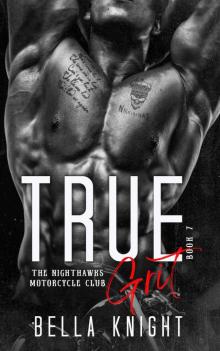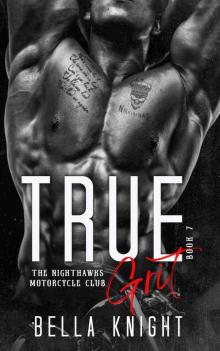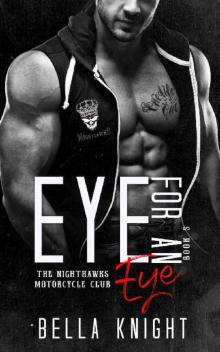- Home
- Bella Knight
Rescued MC (The Nighthawks MC Book 13) Page 4
Rescued MC (The Nighthawks MC Book 13) Read online
Page 4
Every other night, Pete, he should call him Pomp now, took him to the jazz clubs. He learned how to listen, how to reach into the music. He was given a tablet computer, and he was expected to learn to read sheet music for at least half an hour a day. He’d done it by ear for so long; jazz was like that. But, learning the notes was interesting.
He had a corner of the tent where he could see out. The tent made sense to the back of his brain; he’d been a soldier. Doing tasks in a tent made sense to him. So, he did as ordered. Robert showed him how to remove damaged parts, how to box them for the junkyard. Then, how to clean parts, and how to build from the engine outward. How to hook up brakes and electrical systems. The work interested him somewhere deep inside, made him kind of hum in his chest.
And, out of the tent, he watched the little girl and her laughter. Her aunt, Inola, watched her, helped her exercise all the horses, and the little ponies too. They brushed them and cleaned out their hooves. The first time he saw a little girl clean out the hooves of a giant horse, he nearly ran out of the tent to protect her, but since it might spook the horse, he walked forward, slowly. Robert stopped him, and pointed to his eyes and then Jerry’s eyes. Watch. So, he did. And the horse quietly let the little girl clean out its hooves, tail swishing.
At three weeks, he was allowed to move in upstairs from the work on the farm. On the days after he’d been out to the clubs, he was allowed to sleep in. On the other nights, a hand patted on his door just before dawn. He learned to lumber down the stairs and out to the fence to watch the sun go up. Robert and Triesta would come out too, because of that little hand patting on the door. Sometimes they looked rather disheveled, Triesta’s hair flying up all over, Robert’s hair flying out of its braid. He knew they were having sex; the sounds were clear in the dark. It didn’t make him feel bad. It was a clinging on to life which he understood very well.
He was in a fog, a daze. Pomp —Pete, took him to a doctor, who put him on a treadmill and glared at him. “You, sir, could have given yourself a heart attack losing weight that fast,” said the doctor, Doctor Malis. He was a little guy, with dark, dark hair and black eyes with their shimmering intelligence.
“Wasn’t intentional,” said Jerry.
“Your friend says you’re working on a farm, with a relatively healthy diet,” said Doctor Malis. “He also says you’re in recovery from PTSD.”
Jerry was sick of the term. It seemed to be related to every damn thing —insomnia, nightmares, flashbacks, anxiety, eating too much or too little, sleeping too much, breathing too hard, being tense, having a pounding heart, sweating. He’d lost his friends, people he considered family. He went to their funerals. He’d talked to their relatives, those of them that had any. Jon and Ruden didn’t have any. Both had been foster kids.
To be polite, he said, “Yes.”
“Okay,” said Dr. Ruben. “You need food, rest, sun, and something to do with your time. Sounds like you have all of those.”
“I do,” said Jerry.
“Do you need anti-anxiety or sleeping medication?” asked Dr. Ruben.
“Nope,” said Jerry. The drugs made him feel stupid, slow, half-human.
“Try melatonin,” said Dr. Ruben. “Sets your internal clock. Once it’s set, then go back off of it if you like. Not a drug.”
“Okay,” said Jerry.
“Nothing else needed, really,” said Dr. Ruben. “When you want to, you can attend a PTSD group,” he said. “Your friend says that you have lots of soldier friends, so you can talk to them.”
“Yeah,” said Jerry.
“Okay,” said Dr. Ruben. “Go home and relax.” He smiled. “Glad you’re with friends.”
Something in his eyes made Jerry ask. “Did you serve?” asked Jerry.
Dr. Ruben snorted. “You think I could pay for a medical degree on my own?”
Jerry nodded. He shook hands with the doctor, who gave him a little bottle of a melatonin supplement. Dazed by the lack of having anything shoved down his throat, Pete drove him back to see Robert. Pete didn’t quiz him at all about what the doctor said, just stopped by Sonic so they could stuff themselves with burgers, cheese fries, and peanut butter shakes. Jerry went back to see Robert, and was delighted when Robert actually started to use his tools.
Robert took him on walks, just wandering down trails, saying almost nothing, except occasionally pointing out a chipmunk a snake, or a desert hawk. Jerry liked the quiet, and the man’s quiet existence. Robert didn’t want anything from Jerry except good work and someone to walk with, so Jerry could live with that.
Vi in the house made him wash dishes with her. She rinsed, and he filled up the dishwasher. He would come in after Robert sent him away for his Triesta break, time with his girl. Vi would have him shuck corn, or shell peas, or sweep the floor. She would give him her brown sugar biscuits with honey and a big glass of cherry limeade as his reward, or maybe cookies, peanut butter or chocolate chunk, or even toffee chip. The corgi, Bess, would help by sitting at his feet. He began keeping small dog treats in his pocket for Bess.
Then there were the girls. There were lots of them. Two were Chinese, Jie and Hu, and the other one was Grace, with a quicksilver movement that made him dizzy to watch. Hu played the violin, Jie played the Chinese bamboo flute, and Grace played the guitar and keyboards.
Grace came over with a smaller trumpet, scaled for a child, after one of the super-loud dinners with babies and toddlers and people speaking in every language under the sun. Being around that many people and the noise always left him a little raw. Grace came over to where he was on the porch, and cleaned her little trumpet. He brought out his own trumpet, and cleaned it. The sun was just beginning to go down, an orange ball in the side. He ran through some scales, and Grace did too, following him up and down.
The sun slid lower. He stood, and went out to the paddock. He turned toward the sun. The girls came out, and Inola, and Henry and David who were the house grandfathers, and some of the huge pack of teenagers that lived on the other side of the paddock. Inola sang down the sun, and then Jerry put the trumpet to his lips, and blew out Taps. Grace figured it out, and was with him on the third note. He played it a second time, with her taking it slow like him. The notes died out, and everyone touched each other on the shoulder and went home.
“Blue Blues tonight,” Jerry said to Grace.
“They let me in?” asked Grace.
“Dunno,” said Jerry. “We can try.”
“Let’s go,” said Jerry.
It didn’t occur to him to tell anyone where they were going, that he was leaving on a giant bike with somebody else’s kid, or that he was essentially going to a bar, but Henry watched. He called Pomp, and Pomp was there when Jerry and Grace went into the back door with their trumpet cases. Pomp texted their location, and Henry and David loaded themselves up in the truck and headed to a blues club for the first time in their lives. Since it was a bar and grill and the girl was a performer, Grace was given a Shirley Temple to drink, and she was allowed to sit away from the bar.
Jerry pulled up the sheet music on his cell phone, and Grace downloaded the program and pulled it up. He showed her the five or six songs they usually did in their sets. The drummer pointed a stick at them, and Jerry and Grace took their trumpet cases and sheet music on their phones to the stage. The cocktail server brought over two waters for them.
Grace put her phone on the music stand, and Jerry put his beside hers. He took out his trumpet, and she did too. He played Moon over Bourbon Street, and Grace hit a few notes, all of them correct, but didn’t play the whole thing. The singer, a man in a black suit and a thin white tie, howled at the end, making Grace grin wildly. The female singer came up, and she went into Natural Woman. Grace knew that one, and hit the notes like gold.
Pomp recorded the whole thing on his cell, in the back of the club, and ordered Cokes for Henry and David. They arrived, sat down, and were stunned by Grace. The young girl acted like she’d always been playing trumpet in a blues clu
b. The singer went into Midnight Train to Georgia, and Grace grinned, and belted out the notes. They took a short water break, and the man came up and sang George Michael’s Kissing a Fool. Grace understood the few notes she was supposed to play, and began to have fun with Jerry, chasing his notes.
They took a break, and Grace lit up when she saw her grandfathers in the back. Jerry brought her to them, and they all sat down. “Jerry,” said Henry. “This is a great experience for Grace, but you forgot to tell us you were taking her here.”
“He took me on his big Harley,” said Grace, her eyes still alight. “Even bigger than Mama’s and yours.”
“True,” said Henry, calmly sipping his Coke. “I knew you were taking trumpet on YouTube, but I didn’t know you knew jazz.”
“It naturally lends itself to trumpet,” said Grace. “I don’t want to be in a marching band.” She wrinkled her nose. “Do you know that kids walk around during football games playing music?”
“Don’t knock it, kid,” said Pomp. “Try doing what you’re doing while walking in formation.”
Henry grinned. “I hadn’t realized we were keeping you from football experiences.”
“Soccer’s more fun,” said Grace.
The drummer ticked his cymbal. “We’re up,” said Pomp.
“Awesome,” said Grace.
Henry sent a text, and Ivy snuck over from her own club. They did As Time Goes By from Casablanca, and Ella Fitzgerald’s Summertime, and the male singer came back for a ballad of Mack the Knife. They went into What a Wonderful World.
Ivy wiped tears from the corner of her eyes. She stood, walked over, took the mic from the man, and sang Somewhere over the Rainbow, out of place in her black jeans and silvery shirt, with her daughter playing trumpet. She put a lot of soul into it, and hit the notes beautifully, and so did her daughter.
They walked offstage together, to the audience clapping. Ivy took her daughter to the bathroom, and then made sure she’d had enough water.
“Take her home now, Henry, David,” she said. She side-eyed Jerry. “You ask permission before taking my daughter anywhere, you hear?” she said.
Jerry finally found the fog lifting. He realized his blunder could have sent him to prison, if anyone had thought he was kidnapping Grace. He bowed his head. “I’m really sorry I forgot to get permission first. It won’t happen again, ma’am.”
“Can I come back?” asked Grace, confused.
“Yes, but with permission,” said Ivy, tweaking Grace’s nose. “Your fast brain skipped over that part.”
The manager rushed over, a short man with wavy black hair, wearing a blue suit and a skinny red tie. “Ma’am, your daughter can come by anytime she wants,” he said. “And your friends can drink all the soda and water they want for free. I’m Martin Moon.”
Ivy shook his hand. “I’m Ivy, and this is my daughter, Grace. I run the rock place on the other end.” She meant the other end of Paradise, the street that ran parallel to the Las Vegas Strip.
“I’ve heard you sing,” said Martin. “Can you do one more number, with your daughter?”
Grace nodded. Jerry also nodded. “Alright.” She grinned. “See if you can keep up,” she said to Jerry, and strode back onto the stage. She sang a far more down tempo version of the White Stripes’ Seven Nation Army.
She then went into Joss Stone’s Fell in Love with a Boy, a version of the White Stripes’ Fell in Love with a Girl. She rode the song into sexy goodness.
She took her daughter’s hand, took a bow, nodded at Jerry, and strode out, with head high, her daughter in tow. David opened the door for them, and Henry followed them out. Pomp stayed and glared at Jerry. Jerry shrugged. He’d been stupid. He wouldn’t be stupid again. He took his drilling like a man, as Pomp laid down the rules about interacting with little girls. He brought the moms little cacti in pots the next day as an apology, and promised both of them that he’d ask permission first.
The days took on a golden liquid quality. He learned not to stay out too long in the clubs, so he could wake up by a little girl’s hand patting his door. He taught Grace what he knew, and learned to ask permission to train Grace, as well as to take Grace to the clubs. Grace had to practice, learning The Jazz Songbook in the desert air, plus all the Joss Stone songs. They took walks together, when he wasn’t walking with Robert, scaring the hawks and snakes, chipmunks and rabbits, building up their lung power by walking and playing. At night, Grace met him for Taps. Jie played the flute, and Hu the violin, making a lovely sound at night. They formed a little band, and they learned Chinese songs too, without Jerry.
Two weeks later, Pomp came and put him on his bike, and rode with him out into the desert. The other Soldier Pack members were there, with tents and campfires, chicken and fish to grill, coffee over coals. Tori showed him how to make little caramel chocolate cakes in tin cans dug into the coals. Gregory was their Gunny. He and Tori made sure everything was shipshape and that they left the camp cleaner than they’d found it. They had his trumpet and guitars, and played the ukulele, and they played and sang well into the night.
They told stories, too. The ones about the sock thief who was using them to pad boots on long marches, the talker, the card shark, the singer, the guy they called Croc who never blinked, Rinky who clacked his battle rattle all over three countries, and Rowan who stopped the fighting in three villages by shaming the elders into peace.
They didn’t speak about the dead goats and chickens, the children with no fat on their bones, the wasted lives, boots by the road, or the helmet on a weapon. Stones by the road showing directions to places that no longer existed, gone in firestorms of bombs and trucks, and burning people running away. They knew all those things, in their hearts, as stains in their souls. Things they could not tell their friends, lovers, siblings, parents. But they knew, and they knew everyone else in their pack knew too.
The tents were different, two-person tents instead of barracks, good fresh food grilled over a fire instead of MREs and tin cans, and full bellies. And feet that weren’t baking or chilled, wet or sore, in hiking rather than combat boots. It was all different. Yet, for a night, it was the same, jokes and a hot night under the stars and a soft wind tickling the sand. And, for this night, nobody had to die; nobody had to be on watch for missiles screaming into the night, nobody had to walk the perimeter, giving up sleep, rifle at the ready. They didn’t have to have their sleep interrupted by jeeps or orders. They could just talk, and sleep.
Pomp sat with Jerry and Gregory when everyone else had gone to tents to sleep. Gregory asked, “Do you sleep?”
Jerry nodded. “Just… it’s good. To be with…”
“Us,” said Gregory.
“Yeah,” said Pomp.
“Heard you absconded with a little girl,” said Gregory.
Jerry hung his head. “She wanted to play. I took her to where I played. I forgot I was being an ass by not talking to her moms. My head was still…” He mimicked his head being empty with his hands.
“Your head still gone?” asked Gregory.
“Nope,” said Jerry. “That woke me up. Coulda gotten a little kid killed riding on my bike. Her mom says she’s old enough to ride on my bike, but I get real nervous. Now, Henry and I go in his truck, and Pomp takes me home on the back of his bike.” He grinned. “Ivy is supposed to be slinging drinks at her club and singing, but she shows up to sing.”
“Let me know,” said Gregory. “I would definitely pay to see that.”
“I also talked to the doctor. Being that out of it is too dangerous. The melatonin stuff works for sleeping, and he’s got me on a low dose of anti-anxiety medicine to deal with my depression. Now, instead of a black cloud over me, I kinda have a gray one.” All three men let out a low chuckle.
“You had us scared, Jerry,” said Pomp, softly.
“Sorry ‘bout that. Have to make amends to my brother. I’m getting paid for session work, and Robert is paying me for working on the Harleys. I send most of it home. They don’t
have enough to feed their own damn kids.”
“Your brother working?” asked Gregory.
“At the mini-mart. Genna, his wife, stays home with their three kids. Ain’t got two pennies between them. Can’t afford insurance, stuff for the kids.”
“Have to fix that,” said Gregory. He looked at Pomp.
Pomp looked back. “From what I can tell, your brother owns the house, inherited it from your mom.”
“Yeah,” said Jerry. “Can’t move, or would be paying rent. Barely gets property taxes together. Can’t stay, ‘cause no jobs.”
Pomp sat a minute. “You like working on the bikes?”
“Yeah,” said Jerry. “I do.”
Pomp looked at Gregory, and Gregory shook his head minutely. “So,” said Pomp. “Make bikes, sell ’em, keep some to live on, send the rest to your brother.” He nodded his head. “Or, work for a garage. Harley skills are valued.”
“I can do that,” said Jerry.
“And do session work, build up good cred in the music business,” said Gregory. “Know your craft.” He grinned. “You’re good. Get better. A lot better. I’ve got some gorgeous soul singers that need good session workers.”
“I can do that,” said Jerry, sitting up straighter.
“And treat Grace right or I’ll come down on you and hold you down while her moms remove your spleen with a spoon,” said Gregory.
“Yes, Gunny,” said Jerry.
“Now, get the fuck in bed,” said Gregory.
“Yes, Gunny,” said Jerry.
“Yes, boss,” said Pomp. The men stood, brushed themselves off, and made their way back to the tent.
“That one needs watching,” said Thandie, coming out of the dark. “And, we need to set Spider on the family.”
“Yes and no,” said Gregory, letting the fire go down to embers. “He needs to be responsible for his family, but it won’t be enough for a while.”

 Velvet Ivy (The Nighthawks MC Book 1)
Velvet Ivy (The Nighthawks MC Book 1) Echoes of a MC
Echoes of a MC Raw Deal
Raw Deal Tough Love (The Nighthawks MC Book 6)
Tough Love (The Nighthawks MC Book 6) Echoes of a MC (The Nighthawks MC Book 12)
Echoes of a MC (The Nighthawks MC Book 12) Fractured MC (The Nighthawks MC Book 9)
Fractured MC (The Nighthawks MC Book 9) Rescued MC
Rescued MC Finders Keepers (The Nighthawks MC Book 3)
Finders Keepers (The Nighthawks MC Book 3) Raw Deal (The Nighthawks MC Book 8)
Raw Deal (The Nighthawks MC Book 8) Rescued MC (The Nighthawks MC Book 13)
Rescued MC (The Nighthawks MC Book 13) Lost MC (The Nighthawks MC Book 4)
Lost MC (The Nighthawks MC Book 4) True Grit (The Nighthawks MC Book 7)
True Grit (The Nighthawks MC Book 7) Fractured MC
Fractured MC Sweet Revenge (The Nighthawks MC Book 2)
Sweet Revenge (The Nighthawks MC Book 2) Vacant MC
Vacant MC Vacant MC (The Nighthawks MC Book 11)
Vacant MC (The Nighthawks MC Book 11) True Grit
True Grit Restricted MC (The Nighthawks MC Book 14)
Restricted MC (The Nighthawks MC Book 14) Eye for an eye (The Nighthawks MC Book 5)
Eye for an eye (The Nighthawks MC Book 5) Separated MC (The Nighthawks MC Book 10)
Separated MC (The Nighthawks MC Book 10)